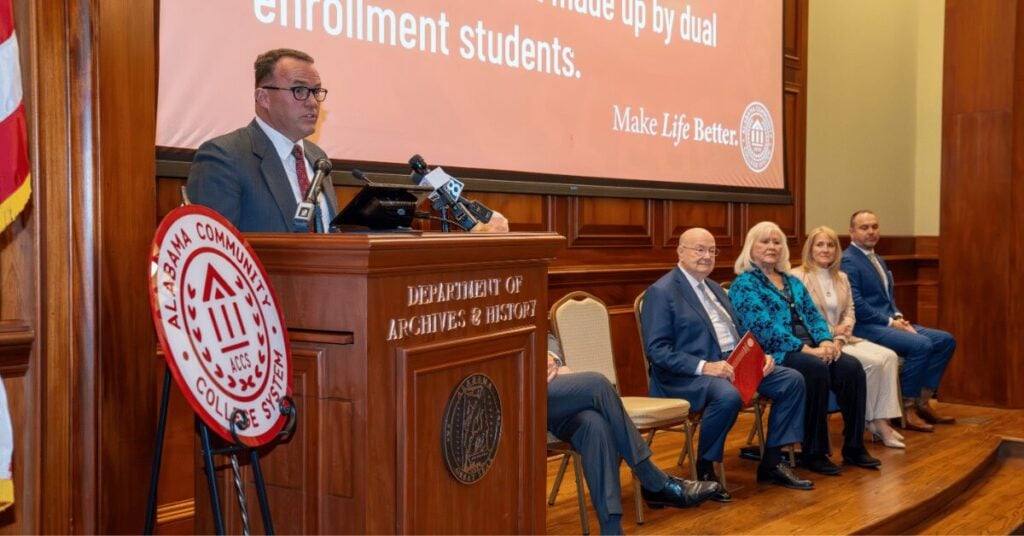MONTGOMERY – The Alabama Community College System (ACCS) announced its intentions to expand its Health Science offerings across the state’s community colleges in 2025, specifically showcasing the new Nursing Support Technician- Certified option in a press conference conducted at the Alabama Archives and History Auditorium.
“The Alabama Community College System constantly fulfills the needs of our business and industry partners and producing highly skilled individuals for the healthcare field is imperative. The opportunities we’re featuring today demonstrate the desire we have must make higher education accessible and attainable for all,” said ACCS Chancellor Jimmy H. Baker.
Nursing Support Technicians are needed in every hospital, healthcare facility, home health and in numerous patient care organizations throughout the state. These workers, making up 12,000-14,000 nursing support staff in Alabama, gain advanced skills in tasks like drawing blood, assisting with respiratory care and other fundamental nursing functions.
The Alabama Board of Nursing announced the new nursing credential last week, aiming to fill more than 2,000 current vacancies in the state.
“For the past 10 years, the Alabama Board of Nursing has been committed to leading the way for a nation facing an ongoing nursing shortage,” said Peggy Benson, Executive Officer for the Alabama Board of Nursing. “The NST-C gives us an opportunity to lead and create a dynamic shift in the nursing industry, and we are proud to explore creative, innovative and sound approaches to address the industry’s toughest challenges.”
The NST-C program is designed for individuals wishing to assist nurses as a multi-disciplinary technical worker, trained to provide basic nursing assistant care.
The ACCS Innovation Center’s Skills for Success team will help facilitate, develop and train individuals interested in the newest program with assistance from Alabama’s community colleges.
Greg Reed, the newly appointed Alabama Senior Advisor for Workforce Transformation and former President Pro Tempore of the Alabama Senate, has observed how the ACCS Makes Life Better for Alabamians in all walks of life, including at his home-based Bevill State Community College.
“Alabama’s workforce is vital to the success of our economic future. Ensuring that Alabamians across the state continue to receive quality training and educational opportunities to bolster their skillsets is a huge factor for workforce development, and I could not be more grateful for partners like the Alabama Community College System and their efforts in this most important work,” Reed said. “I want to thank Chancellor Baker and his team for their continued partnership and leadership and look forward to seeing the positive impact initiatives like this will have on Alabama’s workforce and economic future.”
The ACCS’s Licensed Practical Nursing (LPN) grant program is another that’s building momentum for 2025. There are currently 22 LPN programs, either standalone or LPN to RN mobility, or allied health/military medic to LPN bridge programs, offered at ACCS institutions.
Fourteen 14 ACCS colleges featured registered LPN nursing apprenticeship with 62 employers across seven workforce regions, and overall, the ACCS has experienced a 150 percent increase in dual enrollment since 2015.
With recent approval from the Alabama Board of Nursing, the ACCS is introducing LPN dual enrollment programs this year, providing high school students with the opportunity to earn nursing credentials early, creating a direct pathway into the profession.
The ACCS offers more than 80 Health Science programs or courses among 22 of its 24 colleges, including fields like dental hygiene, health information technology, medical billing and coding, nursing and physical therapy assistant. Registered nursing, medical/clinical assistant and emergency medical technology (paramedic) feature the highest enrollments among healthcare fields across the system.
During the 2023-2024 academic year, more than 13,000 students were enrolled in healthcare programs at Alabama’s community colleges with 12 percent of that made up by dual enrollment students.
From Fall 2022 to Summer 2024, more than 23,000 students enrolled in a healthcare program at an Alabama community college. Of those, nearly 2,300 students – about 10 percent – successfully transferred to four-year universities to further their education.
Skills for Success training has also developed industry-recognized curriculum to aid the healthcare industry in areas like Ambulance Operator, Community Health Worker, Customer Service and Mental Health Worker.
For more information about ACCS healthcare programs, visit https://www.accs.edu/healthcare/
About ACCS
Alabama’s community and technical colleges were merged into one system May 3, 1963, when legislators laid the groundwork for a unified system of institutions to focus on accessible training in “arts and sciences and in useful skills and trades” for current and future labor needs. Sixty years have passed, but that important cause remains the singular purpose of the Alabama Community College System (ACCS). With 24 community and technical colleges in more than 130 locations and an economic impact of $6.6 billion, the ACCS is Alabama’s gateway to first-class, affordable education and technical training to compete in a constantly evolving workforce. More than 170,300 Alabamians benefit from the various certification, credential, dual enrollment and degree programs the ACCS offers alongside leading industry partners. The System includes the Alabama Technology Network, which provides extensive training and service offerings directly to business and industry, and the ACCS Innovation Center, which provides rapid skills training through its Skills for Success program. The ACCS is governed by the Alabama Community College System Board of Trustees.
If you have exciting news to share with the Central Alabama business community, send your press releases (and high-quality images) to [email protected].







